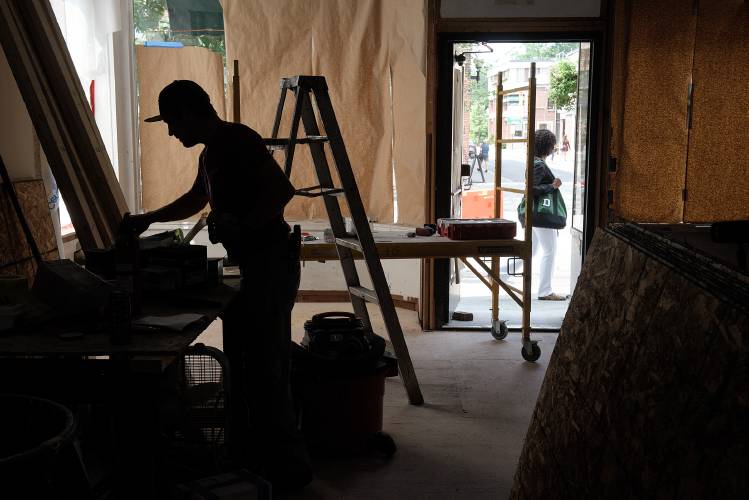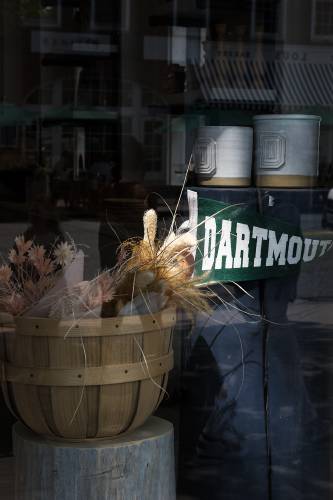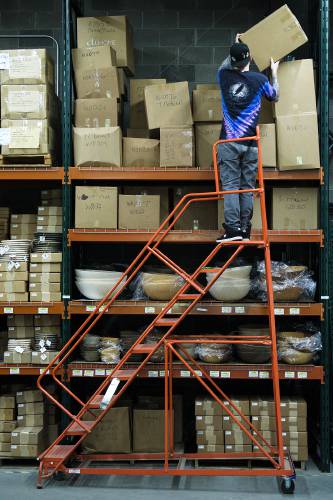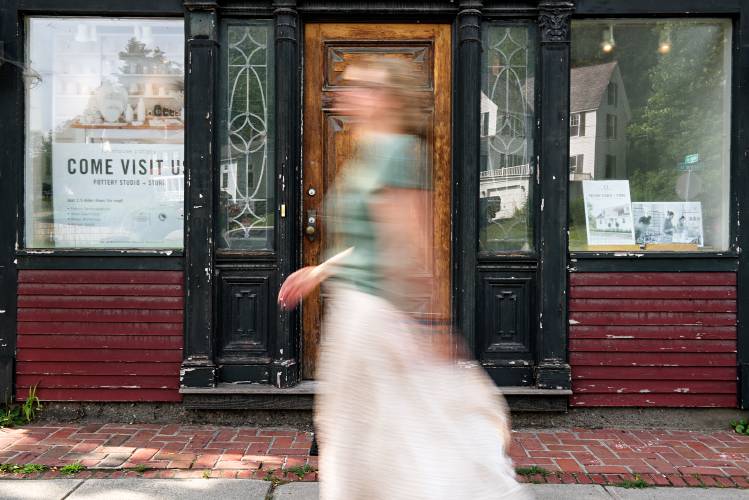Hanover seeks vibrancy as downtown businesses shift from retail to service
| Published: 07-31-2023 5:06 AM |
HANOVER — When the owner of the downtown Hanover apparel and jewelry store Traditionally Trendy folded up shop after 31 years in business, Kayla Brannen made a beeline to the vacating store’s landlord.
Brannen, who has worked as a stylist for 20 years — the last six as owner — at the Maven salon located on the second floor above Traditionally Trendy, long had her eye on one of the prime retail spots below her salon on Hanover’s South Main Street.
“Things are moving around in Hanover and clients come up for their appointments, but I don’t have a lot of people coming in off the street,” Brannen said about taking over the storefront space, which is undergoing construction and, she hopes, will be ready to occupy by September.
The new space will not only provide Maven with a roomier floor with 10 stations for stylists while holding onto the upper floor for spa treatments — manicures and pedicures — but also give the salon a street-level connection to the public.
“It will be exciting to really feel more part of the town,” she explained.
By “moving around,” Brannen is referring to a trifecta of downtown Hanover retail stores all closing in rapid succession: Traditionally Trendy last November, Hanover True Value in April and Farmhouse Pottery, when its lease expires next week.
The closings of the prominent retailers all packed so closely together again raises questions about the future of downtown Hanover — the home of one of the wealthiest colleges in the country — as a place where people want to visit to spend their money shopping, dining and socializing.
Hanover should be brimming with people walking the streets, shopping in stores and eating in restaurants. But the town, even its most gung-ho boosters acknowledge, lacks the robustness tourism economy of Woodstock or even the bohemian urban vibe of White River Junction.
Article continues after...
Yesterday's Most Read Articles
At the same time, there are ambitious entries such as the recently opened live stage and dining venue Sawtooth Kitchen and The Works, a cafe, breakfast and lunch spot that is slated to open by the end of the year in the former Canoe Club space and also recently opened a location at Dartmouth Hitchcock Medical Center.
Both offer encouraging signs that entrepreneurs have not altogether given up on the future of downtown Hanover.
The economic backbone of Hanover has fundamentally changed, which some have been “late to grasp,” said Kieran Campion, the founder of Sawtooth and whose family has long been an owner and leaser of key South Main Street commercial real properties.
“The economy has shifted away from goods to services. Hanover is very much a service industry town now,” said Campion. “It’s restaurants, real estate firms, banks, hair salons, things like that. It’s not dry goods and hardware any longer.”
Pointedly, there are now eight real estate agencies in downtown Hanover, with Keller Williams Realty recently opening in the backside of the Nugget Arcade building in the space that was previously occupied by boutique consignment store Pink Alligator and Berkshire Hathaway/Vermi Realty moving into the Buskey Building in space that had previously been the restaurant Everything But Anchovies on Allen Street.
And wealth management firm Morgan Stanley Financial Advisors has relocated from Lebanon into a second floor suite in Hanover’s Buskey Building, joining a growing array of financial firms along South Main Street.
The high rent charged by the downtown’s commercial real estate owners is a barrier to many retail efforts, and landlords have demonstrated a willingness to keep spaces vacant for literally years in the absence of a tenant willing to pay what’s being asked.
Farmhouse Pottery, with what appeared to be a fail-safe location at the smack center of South Main Street, is a cautionary tale about the challenges of running a retail store in Hanover.
Opened five years ago, Farmhouse Pottery itself filled the space vacated by high-end apparel retailer Rambler’s Way, which lasted only 17 months before closing due to insufficient sales.
Before that, the women’s apparel store Rare Essentials, which closed in 2015, had been in the spot for 30 years.
Kim Gaines, operations manager at Farmhouse Pottery, said the company was closing its Hanover store, which it opened in 2018, in order to “refocus our efforts at our flagship store in West Woodstock, growing that location and our e-commerce platform.”
Farmhouse Pottery recently purchased a property on Route 4 into which it has moved its warehouse and shipping department. That, in turn, will free up space at the flagship store to “overhaul our retail space to provide a bigger and better shopping experience,” including possibly — echoing the Simon Pearce store and restaurant in Quechee — “restaurant opportunities.”
Gaines termed Farmhouse Pottery’s store in Hanover a “good experiment to get a pulse on having a second physical location” and “created a wealth of brand advertising and getting our name out there.” She characterized sales as “about what we expected. Would we have loved it to be more? Sure. But most stores and companies would say that.”
The shifting economic base of downtown — fewer merchants to supply everyday needs and more service firms catering to the well-to-do — has led a group of business owners and new Town Manager Alex Torpey to develop a set of initiatives to encourage people coming into Hanover to support the retail stores and restaurants that remain.
The group of between 20 to 30 members, which includes representatives from Dartmouth’s community relations office, has been meeting the first Thursday every month over breakfast at Campion’s Sawtooth venue space and restaurant in the below-ground level of what was the Dartmouth Bookstore and is now occupied by My Brigadiero bakery and chocolatier and Still North Books & Bar bookstore, cafe and wine bar.
In recent weeks, fruits of some initial efforts have begun to appear, from removing the shrubbery in front of Hanover Town Hall to create a public space that will feature tables and benches where people can gather and socialize to the debut of a new website, explorehanovernh.com, that went online to promote area restaurants, activities and events.
Banners will also soon begin popping up on South Main Street light poles trumpeting “Two dozen restaurants in two blocks!,” “You’re currently on the 1,290 mile of the Appalachian Trail!,” “Allan Street block party last Saturday and Friday of August” and “Meter parking is always FREE after 5 p.m. and all day Sunday!” that are meant to promote downtown’s virtues and encourage people to visit.
Although the town has always had free parking at night and on Sundays, “many people don’t know or have forgotten it and we’ve never advertised that,” said Jim Rubens, owner of the Hanover Square commercial tenant building on Lebanon Street, who heads up the group’s parking and transportation committee.
Torpey, the municipal manager, said the town will begin experimenting with closing off Allen Street to vehicle traffic the last weekend in August for a “block party” that will feature music and food. If it works in drawing people into downtown, he said, it is possible town staff may recommend closing off the street — which many people mistake for an alleyway — next summer altogether.
The town is also working up a “Halloween or fall-themed” Allen Street block party in October and a “home for the holidays” themed event in December.
He said the town is also “in negotiation” with property owners who he did not want to identify for other “public space events.”
All these initiatives, Torpey said, are antecedent to “the big conversation” in the next town planning budget cycle about proposing to widen sidewalks along South Main Street and creating “protected” bike lanes to make downtown more pedestrian friendly. That would entail redrawing and eliminating some parking spaces but it would also enhance the outdoor dining for South Main Street restaurants that has become a huge draw in summer.
“It would benefit all our businesses,” he said of the idea.
Restaurants and cafes, which occupy about a quarter of Hanover’s approximately 70 storefront and commercial spaces, account for the largest category of downtown businesses, with real estate agencies, numbering eight, the second largest group.
Jarett Berke, a Tuck graduate who bought South Main Street’s mainstay Lou’s Restaurant five years ago and is the prime mover behind the business and merchant community’s efforts to make downtown more vibrant, said the story is a familiar one among many small towns around the country that first suffered the drain of customers to box store corridors and then were walloped by online shopping.
The pandemic only made things tougher by turbo-charging home delivery.
Berke said it is becoming increasingly harder to draw Dartmouth students south of Wheelock Street because the trend of the college administration has been to offer ever-better dining options on campus. That even extends to supplies students require, such as computers and headphones — “There is basically an Apple store in the basement of McNutt Hall,” he said.
“I don’t think the college is intentionally trying to undermine the town,” Berke reflected. “It’s just an organization getting bigger because that’s what organizations do.”
And whereas once the floors above the street-level retail shops of buildings along South Main Street used to be apartments, some have been converted into office space, many of them occupied by financial firms. That has led to a decline in pedestrian traffic on the street, with fewer residents popping into the stores and cafes.
Berke said he recognizes the value office tenants bring to commercial real estate owners “but you need a balance between businesses that benefit from foot traffic” such as real estate agencies and “businesses that create foot traffic” such as restaurants and stores.
The imbalance is not lost on Campion, who wants to make Sawtooth a generator of foot traffic. The fact that real estate agencies now make up the second biggest category of downtown businesses reflects the new reality on the ground — or street.
“It’s a bit ironic that they are occupying real estate that no one else can afford,” said Campion.
Contact John Lippman at jlippman@vnews.com.








 Plan on track to ship Upper Valley mail to Connecticut for sorting
Plan on track to ship Upper Valley mail to Connecticut for sorting West Lebanon crash
West Lebanon crash Over Easy: On bread, buttered popcorn and big sandwiches
Over Easy: On bread, buttered popcorn and big sandwiches
